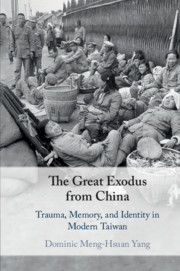Book contents
- The Great Exodus from China
- The Great Exodus from China
- Copyright page
- Dedication
- Contents
- Figures, Maps and Tables
- Acknowledgments
- Note to the Reader
- Abbreviations
- Maps
- Introduction
- 1 The Exodus
- 2 Wartime Sojourning
- 3 Cultural Nostalgia
- 4 The Long Road Home
- 5 Narrating the Exodus
- Epilogue
- Bibliography
- Index
3 - Cultural Nostalgia
Published online by Cambridge University Press: 12 September 2020
- The Great Exodus from China
- The Great Exodus from China
- Copyright page
- Dedication
- Contents
- Figures, Maps and Tables
- Acknowledgments
- Note to the Reader
- Abbreviations
- Maps
- Introduction
- 1 The Exodus
- 2 Wartime Sojourning
- 3 Cultural Nostalgia
- 4 The Long Road Home
- 5 Narrating the Exodus
- Epilogue
- Bibliography
- Index
Summary
Chapter 3 uncovers the memory production that centered on the mainlanders’ native places in China, which emerged after the shock of 1958. When people realized that they might never see home again in their lifetimes, a profound sense of loss and depression began to set it. The need to mitigate this “social trauma of the diminishing hope (for return)” resulted in efforts to gather, preserve, and disseminate “local references” – historical and cultural information about one’s home provinces, counties, towns, and villages in China via shared memories. These efforts manifested themselves in the publication of provincially based magazines and books, as well as in public exhibitions and the construction of temples and cultural museums. The mainlander native-place associations became the main driving force behind these mnemonic projects from the early 1960s to the mid-1980s. Going against the previous interpretation that saw these activities as part of the state-led Chinese Cultural Renaissance Movement, the chapter argues that the production of native-place memories was closely associated with mainland exiles’ attempts to rebuild community, to seek roots locally in Taiwan, and to pass on their native-place identities to their Taiwan-born children. Unfortunately, young mainlanders were uninterested in their parents’ native-place memories and identities.
Keywords
- Type
- Chapter
- Information
- The Great Exodus from ChinaTrauma, Memory, and Identity in Modern Taiwan, pp. 127 - 167Publisher: Cambridge University PressPrint publication year: 2020



